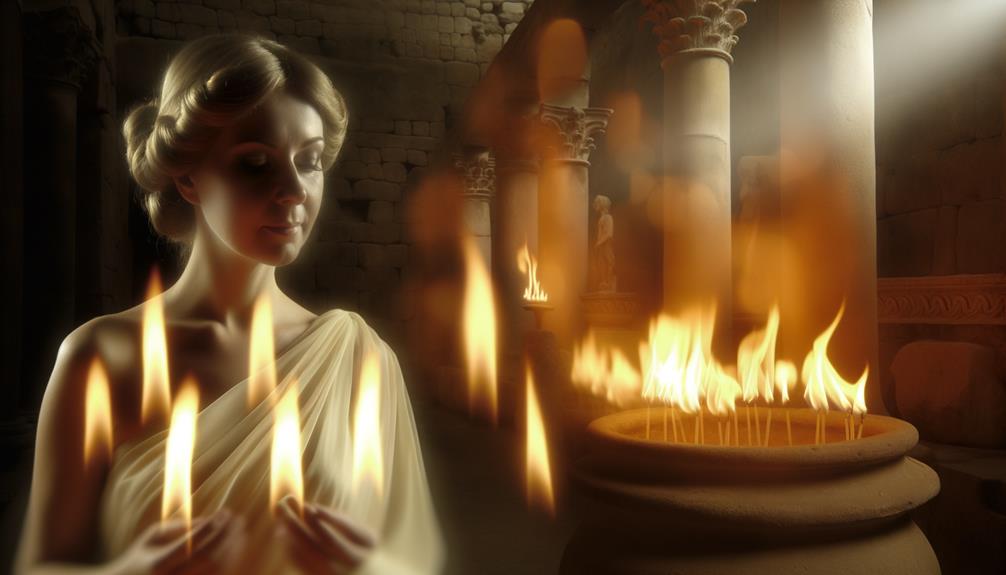Meaning of the Name Vesta
The name Vesta originates from ancient Roman mythology and derives from the Greek word 'Hestia.' Vesta was revered as the Roman goddess of the hearth, embodying home, family unity, and the continuity of society. The Vestal Virgins were her guardians, maintaining her sacred flame which symbolized the stability of Rome.
Vesta's legacy extends into modern culture, where her name signifies warmth, protection, and domestic well-being. Adopted as a given name in the 19th century, Vesta remains a unique and meaningful choice.
Exploring more about Vesta reveals her profound impact on both ancient and contemporary spheres.

Key Takeaways
- Vesta is derived from Roman mythology, symbolizing the goddess of the hearth and home.
- The name embodies stability, protection, and domesticity.
- Originates from the Greek word 'Hestia', highlighting linguistic heritage.
- Reflects the role of the sacred eternal flame and communal well-being.
- Vesta signifies continuity and unity in both ancient and modern contexts.
Origin of the Name Vesta
The name 'Vesta' originates from ancient Roman mythology, where Vesta was revered as the goddess of hearth, home, and family.
Linguistically, the name 'Vesta' is derived from the Greek word 'Hestia,' indicating a deep cultural exchange between Roman and Greek traditions.
Historically, the etymology of 'Vesta' reflects the central role of the hearth in both domestic and communal settings, symbolizing warmth, protection, and sustenance.
The term 'Vesta' encapsulates the essence of stability and continuity in Roman society. Its usage underscores the importance of the household's spiritual and physical center, embodying both divine protection and familial unity.
Therefore, the name 'Vesta' is rich in historical significance and linguistic heritage, embodying core values of ancient Roman life.
Vesta in Roman Mythology
In Roman mythology, Vesta is revered as the goddess of the hearth, embodying the sanctity of the home and the stability of the state. Central to her worship was the sacred eternal flame, meticulously maintained by the Vestal Virgins, which symbolized the continuity and protection of Rome.
This veneration underscores the etymological roots of her name, which is derived from the Proto-Indo-European *h₂wes- ('to dwell, stay'), emphasizing her role as the guardian of both domestic and civic permanence.
Goddess of Hearth
Vesta, revered in Roman mythology, embodies the goddess of the hearth, symbolizing the essential flame that sustained both family and state. The name 'Vesta' is derived from the Proto-Indo-European root *h₂wes-, meaning 'to dwell' or 'to stay.' This etymology underscores her role as a guardian of domestic life and communal stability. Vesta's significance extended beyond the household, as she was integral to the public and religious spheres of Roman society.
| Aspect | Description |
|---|---|
| Etymology | Derived from Proto-Indo-European *h₂wes- |
| Function | Guardian of the hearth and domestic life |
| Cultural Role | Central to family and state rituals |
Understanding Vesta involves recognizing her dual role in nurturing both the intimate and civic domains, embodying the continuity and unity of Roman life.
Sacred Eternal Flame
Central to Vesta's veneration was the sacred eternal flame, a symbol of both divine presence and the perpetuation of Roman civilization. This flame, housed within the Temple of Vesta, was maintained by the Vestal Virgins, priestesses dedicated to the goddess.
The Latin term 'ignis perpetuus' translates to 'eternal fire,' signifying the uninterrupted nature of this holy flame. Its continuity was believed to be essential for Rome's prosperity and stability, symbolizing the endurance of the state's spirit and the protection of its people.
Historically, the flame's extinguishment was seen as an ominous portent, necessitating elaborate rituals for its rekindling. Therefore, the sacred eternal flame of Vesta encapsulated the divine guardianship and enduring essence of the Roman Empire.
Symbolism of the Hearth
The hearth, etymologically rooted in the Old English word 'heorþ,' has long symbolized the center of domestic life and communal well-being.
Historically, its significance transcends mere physical warmth, embodying the cultural and spiritual heart of ancient societies.
This centrality is vividly illustrated in the veneration of Vesta, the Roman goddess whose sacred fire epitomized both the protection and unity of the household and state.
Hearth as Ancient Symbol
In ancient cultures, the hearth symbolized not merely a physical source of warmth and sustenance but also a profound representation of home, community, and sacred space.
The term 'hearth' originates from the Old English word 'heorþ,' which denotes a fireplace or a focal point for domestic life. Historically, the hearth was the nucleus of the household, a place where families gathered, stories were shared, and rituals were performed.
It embodied a sense of continuity and stability, acting as a sacred locus that connected the mundane with the divine. This symbolism transcended mere physicality, encapsulating the essence of unity and belonging within a community.
The hearth's enduring significance is evident in its linguistic and cultural imprints across civilizations.
Cultural Significance of Hearth
Across various cultures, the hearth's symbolism extends beyond its physical presence, reflecting deeper metaphysical and communal values intrinsic to human societies.
In ancient Greek and Roman traditions, the hearth was considered the heart of the home, a sanctified space dedicated to Hestia and Vesta, goddesses of the hearth and domesticity.
The term 'hearth' itself originates from the Old English 'heorþ,' denoting a place for fire that also connotes warmth, sustenance, and familial unity.
In numerous societies, the hearth serves as a focal point of communal gatherings and rituals, embodying stability, continuity, and protection.
The hearth's enduring symbolism underscores its role as a cultural cornerstone, emphasizing its integral place in the social and spiritual fabric of human life.
Role in Roman Society
Regarded as the divine embodiment of the hearth, Vesta occupied a central role in Roman society, symbolizing the unity and stability of both the family and the state. Her presence was integral to the well-being of the household and the broader community, reflecting the importance Romans placed on domestic and civic harmony. The cult of Vesta was deeply interwoven with Roman identity, where her eternal flame represented the continuity of the Roman people.
| Aspect | Role in Society |
|---|---|
| Hearth | Symbol of home and family unity |
| Eternal Flame | Continuity and state stability |
| Vestal Virgins | Guardians of sacred fire |
| Household Worship | Daily rituals for familial harmony |
| Public Ceremonies | Integral to civic religious events |
The etymology of "Vesta" traces back to the Proto-Indo-European root *hₑwes-, meaning "to dwell, to live."
Vesta's Sacred Rituals
Central to the worship of Vesta were the meticulously performed rituals that underscored her significance in both domestic and public spheres.
The goddess Vesta, whose name derives from the Proto-Indo-European root *h₂wes- ('to dwell'), was intrinsically linked to the hearth and home.
Key rituals included the maintenance of the sacred fire, which symbolized the continuity of the state and the household.
The annual Vestalia festival, held in June, saw the opening of Vesta's sanctuary to matrons who offered simple sacrifices of food.
Additionally, the purification of the temple and the ceremonial sweeping were essential practices, reflecting the goddess's association with purity and the sanctity of communal and familial bonds.
These rituals reinforced Vesta's role as the protector of the domestic sphere.
The Vestal Virgins
Integral to the worship of Vesta were the Vestal Virgins, a group of priestesses whose role was paramount in maintaining the sacred fire and performing rituals that secured the spiritual well-being of Rome. These custodians of Vesta's flame were chosen between the ages of six and ten and committed to a 30-year term of service. Their duties included not only tending to the eternal flame but also safeguarding wills and important documents. The name 'Vestal' signifies purity and dedication, aligning with their vow of chastity.
| Role | Age of Selection | Term of Service |
|---|---|---|
| Flame Keeper | 6-10 years | 30 years |
| Ritual Performer | 6-10 years | 30 years |
| Document Guardian | 6-10 years | 30 years |
Their influence extended beyond religion, symbolizing Rome's enduring sanctity.
Vesta in Modern Culture
While the Vestal Virgins once epitomized Vesta's ancient sanctity, the goddess's influence has permeated modern culture in ways that reflect her enduring legacy.
Vesta, derived from the Latin word for 'hearth,' symbolizes domesticity and home life, concepts that have maintained relevance through the centuries.
In contemporary times, Vesta's name graces various domains, from space exploration—where the asteroid 4 Vesta bears her name—to literature and art, where she symbolizes the nurturing aspects of human experience.
The word's etymological roots underscore its association with warmth, protection, and continuity.
This linguistic and historical richness ensures that Vesta remains a potent symbol, seamlessly integrating ancient reverence with modern interpretations of home and sanctuary.
Vesta as a Given Name
The name Vesta, rooted in ancient Roman mythology and etymology, has evolved into a unique and evocative given name in contemporary society.
Originating from the Latin word 'Vesta,' it refers to the Roman goddess of hearth, home, and family. This deific association imbues the name with a sense of warmth, protection, and domesticity.
Linguistically, the name encapsulates the essence of steadfastness and sacred duty, reflecting the goddess's role as the guardian of the eternal flame.
Historically, its adoption as a given name is relatively modern, emerging in the 19th century during a period of revived interest in classical antiquity.
Today, Vesta remains a rare yet meaningful choice, resonating with those who appreciate its rich historical and linguistic heritage.
Legacy of Vesta
Vesta's legacy endures through her profound influence on Roman culture, language, and religious practices. As the goddess of hearth, home, and family, she was central to Roman daily life and spiritual ethos.
The Latin term 'focus,' meaning hearth, is directly linked to Vesta, underscoring her role as the focal point of domestic and communal stability. Her sacred fire, maintained by the Vestal Virgins, symbolized the continuity of the state and the sanctity of the home.
The etymology of Vesta, deriving from the Proto-Indo-European root *h₂wes- ('to dwell, stay'), reflects her foundational importance. Her name and attributes have permeated modern language and culture, illustrating how ancient deities can shape contemporary understandings of community and sanctity.
Conclusion
The name Vesta, steeped in Roman mythos and cultural significance, embodies the essence of the hearth and home.
Echoing through the annals of history, Vesta's legacy is interwoven with the sanctity of domesticity and the Vestal Virgins' sacred duty.
This moniker, once a beacon of societal values and spiritual reverence, now transcends its ancient roots, resonating in modern nomenclature with an ageless grace.
Vesta's enduring presence underscores a timeless reverence for tradition and purity.






